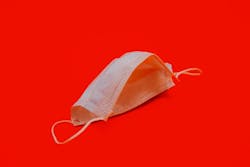It’s become cliche at this point, but there’s no denying how big of an impact COVID-19 has had in all facets of life.
Even now, more than a year and a half after the virus was officially declared a pandemic, many of the protocols put in place to help deter the spread of the virus are still in effect.
Despite the catalyst for their implementations being a global pandemic, though, many of those protocols and changes to day-to-day operations in quick oil and lube shops across the nation have been seen, at the worst, as net-neutral additions to shop life. In many cases, shop operators have said the updated protocols are a net-positive that haven’t affected the actual service performed on a car and have provided an extra sense of security and safety for customers.
What at one point seemed like drastic and unfamiliar changes are now commonplace, and it seems many of those policies will be here to stay in shops across the country.
Different Year, Same Protocols
Mason Benn took over Freedom Lube Services in Nevada, Mo., about two years ago. For a small, three-bay shop in small-town Missouri with an owner new to the quick lube industry, Benn says the slowdown caused by the pandemic actually afforded his team a little more wiggle room to figure out their day-to-day processes than they otherwise would have had.
“There are a lot of hard lessons to learn in the oil business,” Benn says, “but with COVID slowing everything down, it allowed us to adapt, change and streamline our process because the car counts were a bit lower. It gave us the time, and it’s kind of what we needed to get our feet underneath us.”
It also gave Benn and his staff time to figure out how to manage the constant interaction with customers. Freedom Lube no longer requires signatures on debit or credit card transactions, and customers swipe their own cards using the Square card readers to minimize the number of people sharing surfaces.
As has become common practice, the shop has also significantly increased the frequency with which it sanitizes shared surfaces in its waiting room and throughout the store.
Less common, though, is where the store has its customers wait during the actual process of servicing a car. While many shops ditched the lobby atmosphere for customers, Benn and his team worked on making the lobby more safe and sanitary.
“At most places, when you go to get your oil changed, you stay in the car the entire time. With us, we made it to where the customer gets out of the car and goes into our lobby,” Benn says. “With the way our staff works, they’re in and out of that car several times, and that limits the amount of contact that our techs have with the customer. It provides more freedom of maneuverability without having to worry about trying to stay out of people’s bubbles.”
The shop even introduced a pickup service in which a tech retrieves a vehicle from a customer’s residence or workplace, brings it to the shop for service and drops it back off as a way for customers to remain as socially distanced as possible.
“As these new variants keep popping up, people want to isolate a little more, stay at home and have someone come pick up their car for them and change the oil. That way they don’t have to come here and expose themselves to other people or our staff,” Benn says. “It’s not a new thing, but it is for our area. It’s a nice service for our people so they don’t have to go out and fight the pandemic.”
Standard Methods
For stores in other areas that weren’t hit nearly as hard by the pandemic, measures taken to prevent the spread didn’t have to be as intense.
For Jim Troutner’s Eagle Quick Lube and Car Wash in Penn Valley, Ca., more standard prevention methods were used: Outdoor seating, deeper and more frequent sanitizing of common areas, sneeze guards and other measures tried to strike a balance between serving customers both effectively and safely.
“We were trying to accommodate everyone,” Troutner says. “A lot of people would sit outside since we have outside seating. A few people would use the lobby, and in there we picked up the magazines and wiped everything down a lot more.”
Eagle Quick Lube customers could even stay in their car if they wanted to, which normally is prohibited, and if they were especially apprehensive, could pay by calling a tech after their service was done and provide their credit card information without even having to roll down their window.
For the Customer
Despite the extra hurdles COVID added on top of trying to operate a relatively new business, Benn says once his team got into the swing of things, service wasn’t affected.
“Our vehicle times are still right around the 15-minute mark, and at most quick lube places that’s about average whether a customer stays in the car or goes inside,” Benn says. “If we can get them out of their car and it saves them contact, it makes them feel a little bit safer. It’s been nice, and it hasn’t really affected (our service).”
And now that those practices are commonplace, it would take more work to remove them and get adjusted to the “old way” of operating than it would to leave them in place, and because of that Benn says a lot of the day-to-day tasks such as sanitizing more deeply and providing different ways to keep customers more isolated will become part of normal operations moving forward.
“Those are here to stay because it makes the customers feel better, and at the end of the day that’s what we’re here for.”
Troutner says the new protocols have been a neutral change that haven’t affected business, and they provide a little more peace of mind for customers who are apprehensive.
Once again, it’s for the customer.
“We’re trying to stay with what the customer wants,” he says.
And, moving forward, Benn says those newly implemented protocols could actually help the quick oil and lube industries do their part in preventing another situation like the COVID-19 pandemic.
“If you look at all the different diseases and viruses of the world, every year it’s something different. I think that would help ease a lot of that stuff, because a lot of those are transmitted through direct touch or being too close to people, and I think a lot of these practices will help drop a lot of the numbers,” he says. “Now that everyone is staying away from each other and we have these good practices for cleaning in place, it eliminates a lot of those extra issues and I think it’s a great thing that a lot of these practices are going to be sticking around.”

